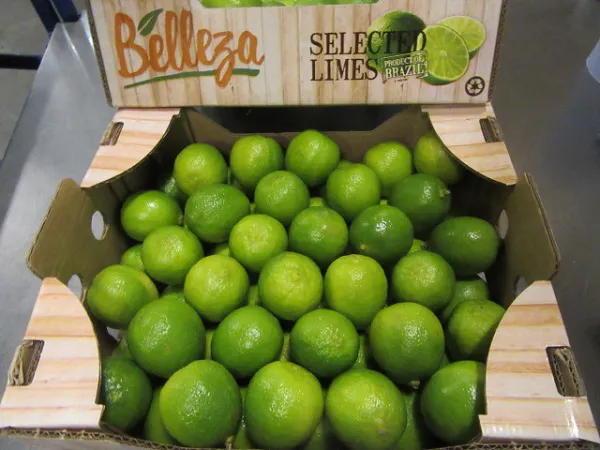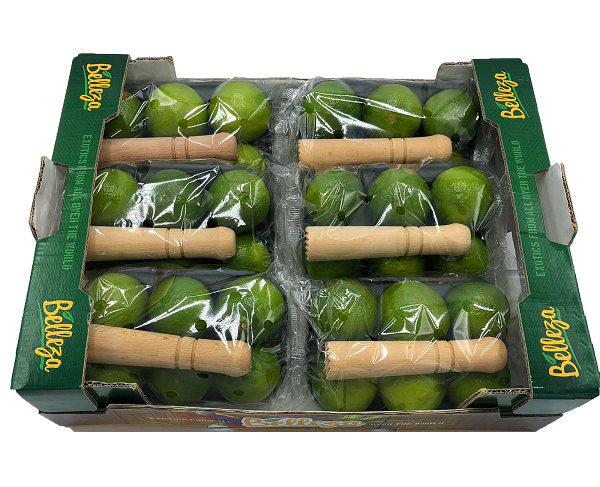Exotics importer Torres Tropical keeps evolving. This year, this Dutch company invested in a packaging line for sustainable packaging and will put a new warehouse into use next year. "We want to focus even more on Fairtrade and organic in the coming years," begins Antoine Heijkoop.

This company specializes in mango, papaya, lime, and ginger. "We supply much more than that, but those four products form our core business. We think the time of trading companies being total suppliers is over. Focus on, and expand the products in which you're good. That's how things are done now. Retailers also prefer to work with specialists. Also, in Brazil, we work with established partners for mangoes, papayas, limes, and ginger."
Torres Tropical imports exotics from across the globe, though Brazil is its top production country. "We own Torres Brazil. Besides cultivating mangoes and limes, we trade a lot of produce, including ginger, figs, and passion fruit, from that country under our own Belleza brand. Brazil is a growth market. There is plenty of investment in warehouses, acreage expansion, etc. By us too. We want to keep growing and specialize in Fairtrade and organic. Several years ago, for example, we started an eco-friendly, Fairtrade project in Bahia, in northeastern Brazil, to cultivate limes. Those growers use almost no plant protection products; in fact, nothing at all post-harvest. That's quite unusual for Brazil. Plus, this project provides much-needed jobs in a poverty-stricken region," says Antonie.
No extra handling pays off
Torres Tropical is not only pumping money into their farm in Brazil but also in the Netherlands. Last year, they purchased a new flow pack machine. "We immediately opted for more environmentally friendly packaging. We used to outsource our packaging; now, we can do everything in-house. It offers more flexibility, and we can easily put together things like mix packs. We're also getting a new warehouse which should be ready next year. It's vital to have logistics and quality in order, especially when costs are rising. That's where your profit lies. Every time a product is handled, it costs money. The new warehouse also allows us room to expand and grow further in Fairtrade and organic limes."
Good festive season market expectations
The present economic uncertainty is not passing this import company by either. Antoine has yet to see this reflected in sales but does expect a market decline early next year. "Everything is much more expensive. Limes, for instance, are very expensive, and a box of limes is selling for €10," he says in mid-November. "Logistics costs also keep climbing, but that may change soon. The big shipping companies are already seeing a drop in business, which will free up some containers. There are, however, always issues in Brazil. The troubled election period is just over.”

“And because of strikes, blockades, and closed ports, there was temporarily less supply. That country has also struggled with high sea freight costs and an unfavorable exchange rate for a while." Antoine remains positive and, in mid-November, was optimistic about the holiday season. "People have less to spend,” he explains, “yet most want to go all out during the festive season. There are no pandemic restrictions this year, and Christmas is at a good time of the week. People can shop until the last minute."
What does Torres Tropical think of supermarkets no longer flying in exotics? "We do quite a few exotics by air. Brazilian papayas always, actually. These are available year-round. We also bring papaya in by boat, but that's a different product. Maximizing the load factor would make a big difference. Sourcing locally is becoming noticeably more and more important. The papayas grown in Portugal and Spain come pretty close, but those volumes aren't nearly enough. Dutch growers are also trying to grow papayas in greenhouses. It wouldn't surprise me if that becomes the future," Antonie concludes.
Antoine Heijkoop.
[email protected]  Torres Tropical BV
Torres Tropical BV
+316 53763217
[email protected]
www.torrestropical.com
